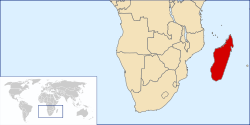| Stripe-throated jery | |
|---|---|
 | |
| Scientific classification | |
| Kingdom: | Animalia |
| Phylum: | Chordata |
| Class: | Aves |
| Order: | Passeriformes |
| Family: | Cisticolidae |
| Genus: | Neomixis |
| Species: | N. striatigula |
| Binomial name | |
| Neomixis striatigula Sharpe, 1881 | |
 | |
| Native range of Neomixis striatigula | |
The stripe-throated jery (Neomixis striatigula) is a species of bird in the family Cisticolidae. It is endemic to Madagascar.
Its natural habitats are subtropical or tropical dry forest and subtropical or tropical moist lowland forest.
